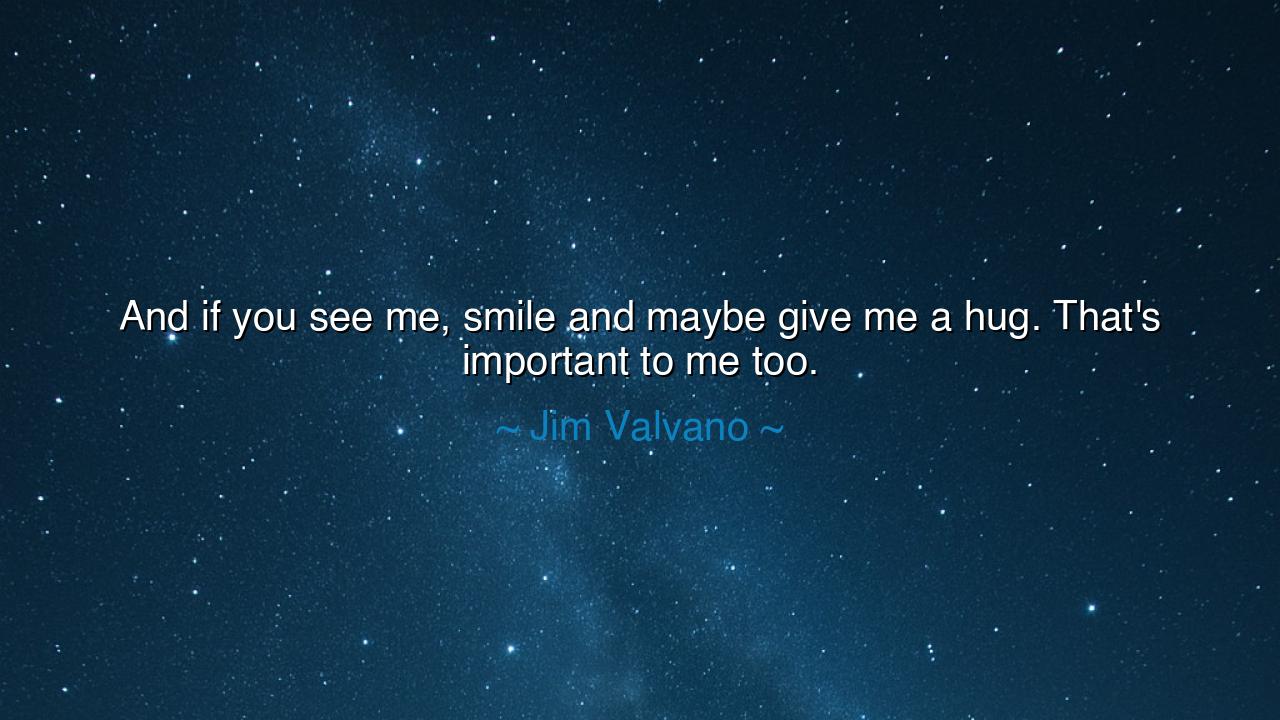
And if you see me, smile and maybe give me a hug. That's






Hear the words of Jim Valvano, the coach whose spirit burned bright even as his body was failing: “And if you see me, smile and maybe give me a hug. That’s important to me too.” At first, it seems a tender plea, almost childlike in its simplicity. Yet beneath it lies the wisdom of one who knew that life’s truest treasures are not trophies nor riches, but the small gestures of love that bind hearts together. For Valvano, who stood before the world battling cancer, this request was not weakness, but strength—it was the declaration that connection is the greatest victory a man can claim.
The origin of these words lies in Valvano’s last public speeches, especially his immortal address at the ESPY Awards, where he urged the world to live fully, to laugh, to think, and to cry each day. In those moments, knowing his time was short, he spoke not of titles won or games remembered, but of the enduring power of kindness. A smile, a hug—simple offerings of affection—become, in his teaching, lifelines of meaning, signs that life is still worth celebrating even in the face of death.
The ancients themselves taught this truth. The Stoics proclaimed that a man stripped of wealth and fame might yet live nobly if he lived in harmony with others. Early Christians, persecuted and scattered, greeted one another with an embrace and a kiss of peace, for they knew that in a hostile world, love expressed in touch and smile was strength itself. In every age, the wise have known: a hug can be a fortress, and a smile a shield against despair.
History gives us another image: consider Abraham Lincoln, who during the Civil War often slipped away from his advisors to visit wounded soldiers in the hospital. He would clasp their hands, speak gently, and offer a warm look or embrace. These were not acts of politics, but of humanity. To men broken by war, the President’s presence, his smile, his touch, gave them courage. Lincoln, like Valvano, understood that greatness lies not in distance but in closeness, not in glory but in compassion.
Valvano’s words also confront the illusion of strength as isolation. Too often, men are taught that to be strong is to stand alone, to endure without comfort. But here, in his final days, Valvano showed a different kind of heroism: the bravery to ask for love. A hug, a smile, these are not signs of weakness but of humility, of understanding that life’s deepest power lies in fellowship. His lesson is not only for the dying, but for the living: do not wait until the end to cherish connection.
The meaning is profound: to give a smile or a hug is to affirm another’s worth, to declare, “You are not alone, I see you, I stand with you.” In a world of rushing and striving, such gestures may seem small, but they are the very marrow of existence. They outlast victories, they heal wounds unseen, they give courage to souls standing at the edge of despair.
Therefore, beloved, let this be your practice: when you meet others, especially in times of sorrow or trial, do not withhold the smile or the hug. Give freely the gifts that cost nothing yet mean everything. Remember Valvano’s request, for it was more than personal—it was universal, a reminder that what makes life radiant is not what we win, but how deeply we love. And when your own days grow short, may you too be surrounded by smiles and embraces, the eternal proof that your life was woven into the hearts of others.






AAdministratorAdministrator
Welcome, honored guests. Please leave a comment, we will respond soon